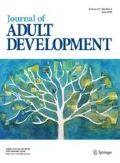Abstract
Developmental coordination disorder (DCD) affects around 5% of the population and is diagnosed on the basis of poor motor coordination. Although we know rather little about the lifetime consequences of this disorder, it is clear that significant difficulties remain through adolescence and into adulthood for the majority. It is also clear that significant psychosocial consequences exist for many individuals with DCD. In the current study, quality of life satisfaction was investigated in a group of emerging adults with and without DCD using the Quality of Life Satisfaction Questionnaire (Endicott et al. Psychopharmacology Bulletin, 29, 321–326, 1993). Overall, the group of adults with DCD reported significantly lower levels of quality of life satisfaction across all domains on the scale. This finding has important implications for consideration of early and later intervention for these individuals, as well as for studies to consider the risk and protective factors at play in long-term outcome with respect to both the motor skills and psychosocial aspects of this disorder.
Similar content being viewed by others
References
American Psychiatric Association. (1994). Diagnostic and statistical manual of mental disorders (4th ed.). Washington, DC: American Psychiatric Association.
Cantell, M., Smyth, M. M., & Ahonen, T. P. (2003). Two distinct pathways for developmental coordination disorder: persistence and resolution. Human Movement Science, 22, 413–431.
Cousins, M., & Smyth, M. M. (2003). Developmental coordination impairments in adulthood. Human Movement Science, 22, 33–59.
Endicott, J., Nee, J., Harrison, W., & Blumenthal, R. (1993). Quality of life enjoyment and satisfaction questionnaire: A new measure. Psychopharmacology Bulletin, 29, 321–326.
Hellgren, L., Gillberg, I. C., Begenholm, A., & Gillberg, C. (1994). Children with deficits in attention, motor control and perception (DAMP) almost grown up: Psychiatric and personality disorders at age 16 year. Journal of Child Psychology and Psychiatry, 35, 1255–1271.
Huppert, J. D., Simpson, H. B., Nissenson, K. J., Liebowitz, M. R., & Foa, E. B. (2009). Quality of life and functional impairment in obsessive-compulsive disorder: A comparison of patients with and without comorbidity, patients in remission, and healthy controls. Depression and Anxiety, 26, 39–45.
Kirby, A., Sugden, D., Beveridge, S., Edwards, L., & Edwards, R. (2008). Dyslexia and Developmental Co-ordination Disorder in Further and Higher Education- similarities and differences. Does the “label” influence support given? Dyslexia, 14, 197–213.
Losse, A., Henderson, S. E., Elliman, D., Hall, D., Knight, E., & Jongmans, M. (1991). Clumsiness in children- do they grow out of it? A 10 year follow up study. Developmental Medicine and Child Neurology, 33, 55–68.
Mick, E., Faraone, S. V., Spencer, T., Zhang, H. F., & Biederman, J. (2008). Assessing the validity of the quality of life enjoyment and satisfaction questionnaire short form in adults with ADHD. Journal of Attention Disorders, 11, 504–509.
Pollack, M. H., Endicott, J., Liebowitz, M., Russell, J., Detke, M., Spann, M., et al. (2008). Examining quality of life in patients with generalized anxiety disorder: Clinical relevance and response to duloxetine treatment. Journal of Psychiatric Research, 42, 1042–1049.
Rasmussen, P., & Gillberg, C. (2000). Natural outcome of ADHD with developmental coordination disorder at age 22: A controlled, longitudinal, community based study. Journal of the American Academy of Child and Adolescent Psychiatry, 39, 1424–1431.
Shafer, S. Q., Stokman, D., Shafer, S. C., O’Connor, P. A., & Schonfeld, I. S. (1986). Ten-year consistency in neurological test performance of children without focal neurological deficit. Developmental Medicine and Child Neurology, 28, 417–427.
Skinner, R. A., & Piek, J. P. (2001). Psychosocial implications of poor motor coordination in children and adolescents. Human Movement Science, 20, 73–94.
Smyth, M. M., & Anderson, H. I. (2000). Coping with clumsiness in the school playground: Social and physical play in children with coordination impairments. British Journal of Developmental Psychology, 18, 389–413.
Acknowledgments
We are grateful to all participants for their help with this study.
Author information
Authors and Affiliations
Corresponding author
Rights and permissions
About this article
Cite this article
Hill, E.L., Brown, D. & Sophia Sorgardt, K. A Preliminary Investigation of Quality of Life Satisfaction Reports in Emerging Adults With and Without Developmental Coordination Disorder. J Adult Dev 18, 130–134 (2011). https://doi.org/10.1007/s10804-011-9122-2
Published:
Issue Date:
DOI: https://doi.org/10.1007/s10804-011-9122-2




